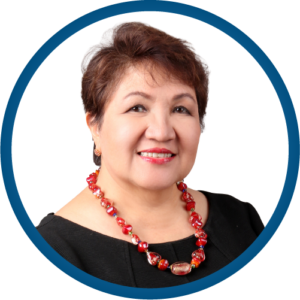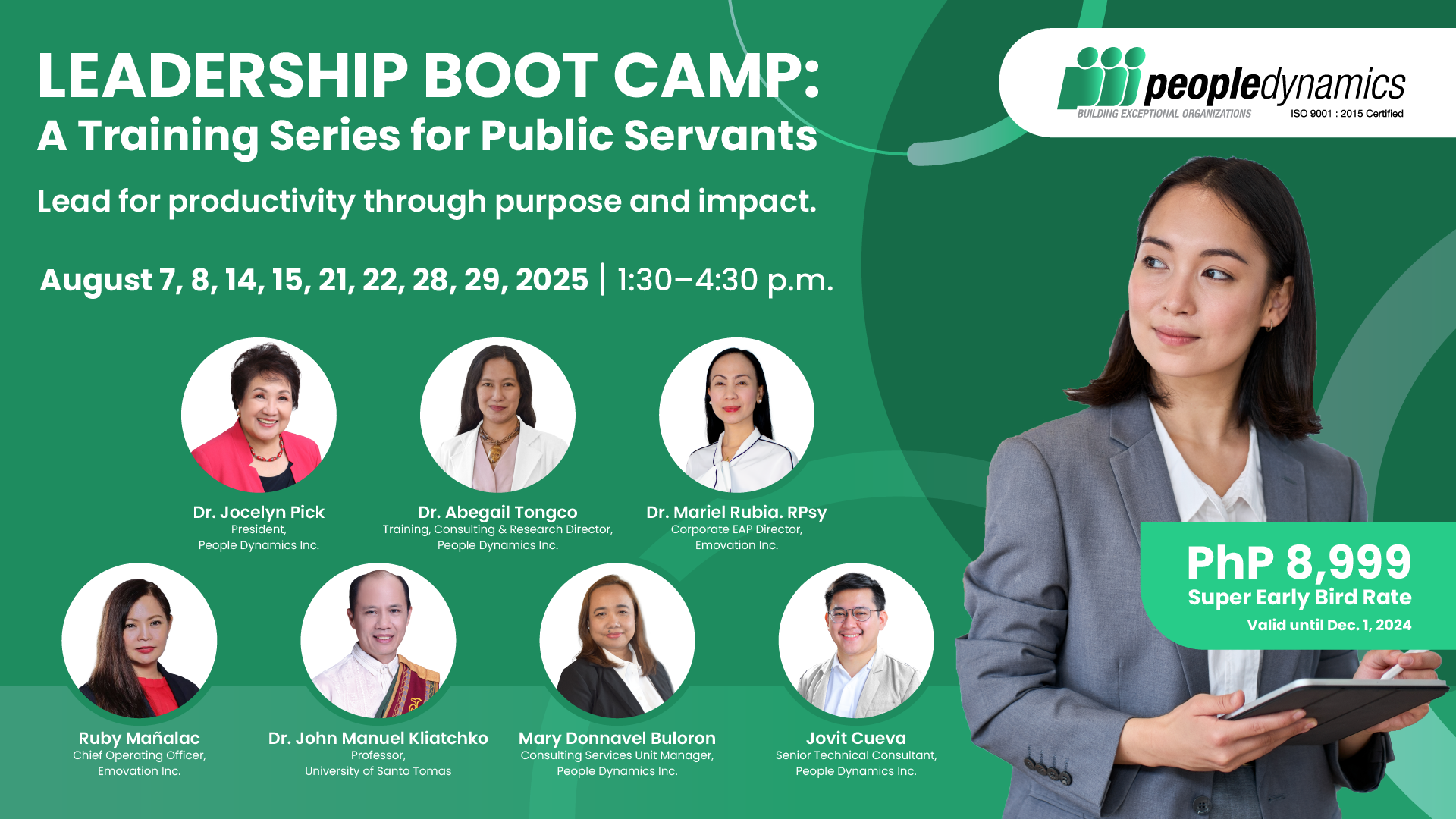About This Training Program
Lead for productivity through purpose and impact.
In today’s fast-paced world, managing productivity is no longer enough—you need to inspire your team to thrive. As the mindset of the younger generations evolve with the changes in the environment, leaders have to transform the way they drive excellence in their work teams.
Our Leadership Bootcamp is designed to equip you with the tools to boost productivity, foster positivity, and inspire unwavering commitment from your team. This isn’t just about managing—it’s about leading with impact.
At the end of the program, the participants shall be able to
- understand their inherent roles and responsibilities as leaders,
- learn how to manage employee grievances,
- discover effective interventions for addressing performance concerns,
- appreciate the various ways to develop camaraderie among teams, and
- help develop team members for positions of higher responsibilities.
August 7, 2025 (1:30–4:30 p.m.)

Dr. Jocelyn Reyes-Pick
This session will focus on the adjustments and preparations required of leaders as they transition to leadership roles.
This is especially relevant to leaders who are still trying to cope with leading colleagues who are working from home or in a skeleton workforce arrangement.
I. Roles and Responsibilities of Supervisors and Managers
-
- Self-Assessment: Leadership Styles
- Inherent Accountabilities of Leaders
- Levels of Leadership
- Individual Contributor
- Leading Others
- Leading Leaders
- Leading with a Vision
- Transformational Leadership
II. The Five Levels of Leadership
- Transitioning to the Leadership Role
- The Stages of Leadership
III. Inherent Functions of Leaders
- Planning for Effective Execution
- Organizing Scarce Resources
- Leading Others to Excel
- Controlling Productivity Standards
August 8, 2025 (1:30–4:30 p.m.)
 Jovit Cueva
Jovit Cueva
This session will focus on the adjustments and preparations required of leaders as they begin to adopt best practices in managing work with business sustainability in mind.
This will require embracing new mind-sets and attitudes toward digital tools and technologies.
Navigating the new normal would likewise require effectively managing generational diversity.
I. Adapting Agile Work Practices
- Best Practices in Managing Multiple Projects and Priorities
- Productivity-Monitoring Tools
- Executing Plans in Virtual Teams
II. Required New Normal Competencies
- Agility and Flexibility
- Problem-Solving and Decision-Making
- Fostering Creativity
- Results-Orientation
- Digital Literacy
III. Managing Diversity
- Differentiating Various Generational Cohorts
- Appreciating Millennials’ Shared Experiences
- Uncovering Gen Zs’ Prevailing Attitudes and Values
- Harnessing Synergy from Diversity
IV. Managing Change
- Helping Team Members Embrace Change
- Managing Resistance to Change
August 14, 2025 (1:30–4:30 p.m.)

Mary Donnavel Libron-Buloron, RPm
This session will focus on the adjustments and preparations required of leaders as they hone and develop the skills and competencies of their staff.
This session also includes the leadership competencies leaders need to help team members excel in their roles.
Participants shall be introduced to the best practices in developing others to become future leaders.
I. Delegating Responsibilities
- Levels of Delegation
- Delegation Checklist
- Monitoring Progress
- Responsibility vs. Accountability
II. Managing Performance
- Performance Planning
- Performance Review and Feedback
- Development Intervention
- Rewards and Recognition
III. Upskilling Workers
- Identifying Training Needs
- Reskilling and Upskilling Requirements
- Trends in Sustaining Learning and Development
- Encouraging Self-Paced Learning
August 15, 2025 (1:30–4:30 p.m.)

Dr. Mariel Rubia, RPsy
This session will focus on the adjustments and preparations required of leaders as they strive to sustain the positivity and enthusiasm of team members despite the current challenges.
Since many of the employees now are working from home, the need to sustain their commitment to the tasks is essential for productivity.
Additionally, employees who are required to report to the office experience high levels of stress and anxiety with their fear of being exposed to getting sick.
This session will focus on equipping leaders with the tools to support employees through these tough times.
I. Motivating Individuals
- Needs and Expectations of Employees
- Identifying the Drivers for Employee Motivation
- Extrinsic and Intrinsic Motivation
II. Understanding Employee Engagement
- Employee Engagement vs. Job Satisfaction
- Designing Jobs for Engagement
- Recognizing the Drivers of Disengagement
- Leaders’ Role in Sustaining Employee Engagement
III. Sustaining Tenacity, Grit, and Optimism
- Maintaining Mental Health and Well-Being
- Essential Self-Care Practices and Habits
IV. Honing One’s Emotional Intelligence as a Leader
- Self-Awareness
- Emotion Regulation
- Empathy
- Relationship Management
August 21, 2025 (1:30–4:30 p.m.)

Ruby Mañalac
This session will focus on the adjustments and preparations required of leaders to connect and communicate with a team effectively.
Since the quality of the leader-member relationship is defined by the quality of communications within the team, leaders need to know what, when, how, and why they should communicate with their teams.
I. Effective Key Messaging
- What Leaders Need to Communicate
- Appropriate Modes of Communications
- Dos and Don’ts in Effective Communications
II. Understanding Effective Means to Communicate
- Ways to Communicate Plans
- Cascading Goals and Targets
- Communicating a Vision
III. Encouraging Healthy Conflict
- Sustaining Open Communications
- Facilitating Brainstorming Sessions to Encourage Openness
- Facilitating Dialogues to Manage Conflict
IV. Managing Meetings Effectively
- Preparing for a Meeting
- Facilitating the Meeting
- Closing the Meeting
August 22, 2025 (1:30–4:30 p.m.)

Dr. Abegail Tongco
This session will focus on the adjustments and preparations required of leaders to sustain collaboration within the team effectively.
It is the leader’s role to sustain healthy group dynamics to ensure that team members are effectively communicating and supporting each other to accomplish team goals.
When other employees work from home, it does not mean that collaboration stop. In fact, members need to exert more energy into communicating and connecting with each other to ensure alignment and focus.
I. Managing a Strong Team
- Team Development
- Managing Differences in Working and Communication Styles
- Leader’s Role in Sustaining Collaboration
II. Sustaining Team Productivity
- Four Dysfunctions of Teams
- Techniques in Addressing Dysfunctional Interactions
- Components Leading to Team Effectiveness
III. Managing the Group Norms
- Aligning the team to the Core Values of the Organization
- Norm-Setting
- Establishing Discipline within the Team
August 28, 2025 (1:30–4:30 p.m.)

Dr. John Kliatchko, RPsy
This session will focus on the tools and techniques that leaders need to learn and utilize to help employees who are failing to meet the performance standards.
It is the leader’s role to understand the causes of the underperformance and to address the barriers for effective performance.
This is crucial in sustaining the productivity of the team and in establishing a supportive relationship with direct reports.
I. Diagnosing Performance Gaps
- Common Causes of Performance Gaps
- Applying the Root-Cause Analysis Model
II. Facilitating Performance Discussions
- Addressing the Unproductive Work Behavior
- Describing the Impact of the Behavior
- Soliciting the Need for Change
- Planning to Adapt to Change
III. Embracing a Coaching Mind-Set
- Working on the Individual Development Plan (IDP)
IV. Helping Others to Cope
- The Coaching Mind-Set
- Basic Counseling Principles
August 29, 2025 (1:30–4:30 p.m.)

Dr. Abegail Tongco
This session will focus on equipping participants with the right skills, attitudes, and competencies required to groom individuals who have the high potential to excel.
This is especially relevant in managing individuals who are aspiring for growth and development and staff members who desire for positions of higher accountability and responsibility.
Leaders must be equipped with the skills to unlock others’ potentials and to inspire them to become their best self.
I. Succession Planning
- Identifying Critical Positions
- Defining the Success Profile
- Identifying Key Talents for Critical Positions
- Planning on How to Groom Identified Talents
II. Career Planning
- Facilitating the Career-Planning Discussion
- Crafting the Individual-Development Plan
- Monitoring Progress
III. Upskilling
- Coaching
- Job Exposure
- Self-Paced Learning
- Online Learning Modalities

